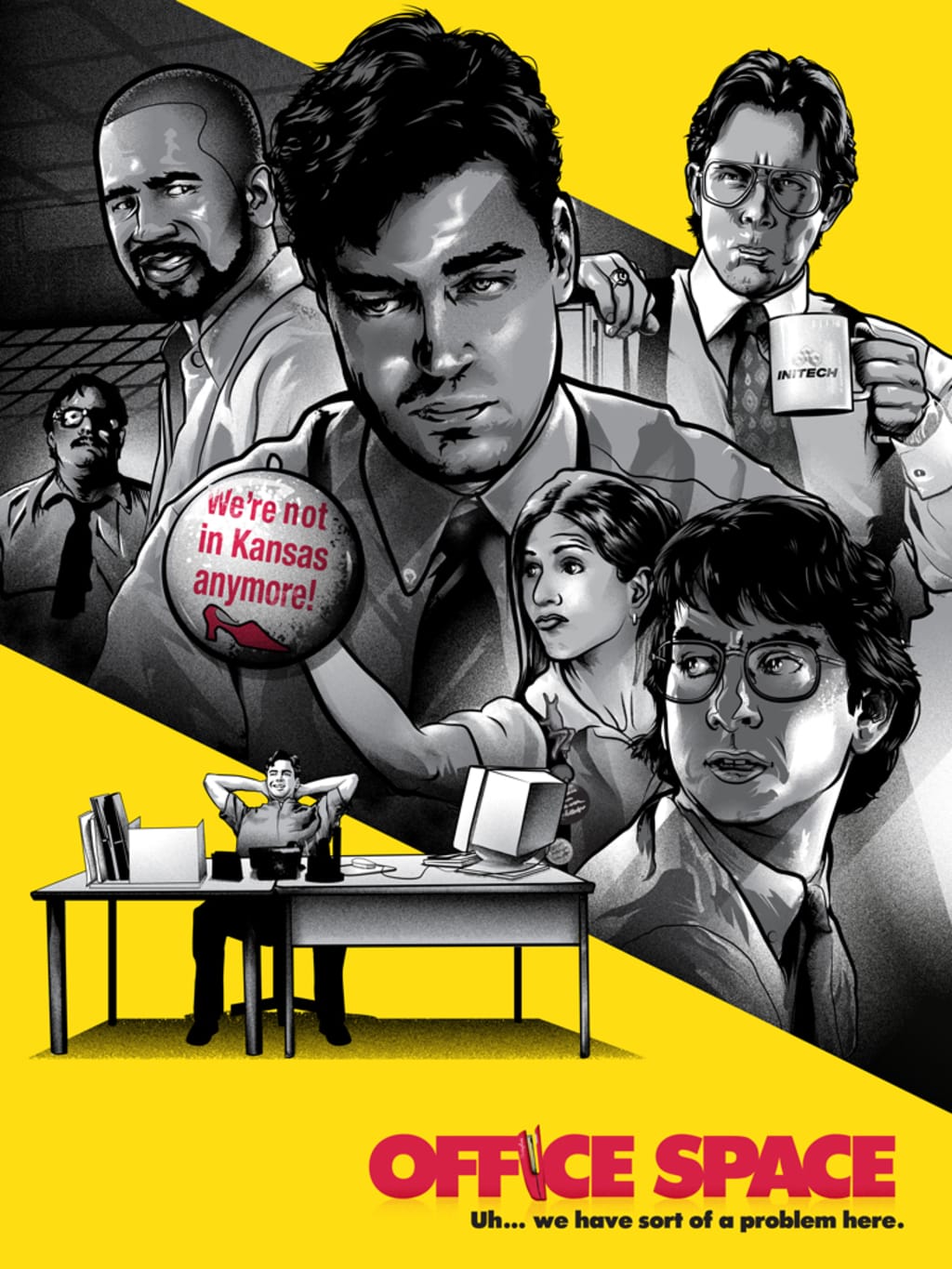
Office Space was written and produced by Mike Judge in February 1999; professional critics gave it a score of 80% on rottentomates.com. However, the score given by the audience was 93%. How would a movie receive such a low score from trusted critics be so high with audience members? This is because Mike Judge was able to capture the essence of everyday life within a dead-end job and being forced to take the punishment of the job to live. This is something everyone in a job has felt one way or another throughout their years of working. Therefore, Office Space was able to hit Cult film status, and it is relevant to this course because it proves that if enough people can relate and like something, it can become quite popular despite what the professionals think.
Office Space’s story is presented today and is centered around Peter Gibbons, whom Ron Livingston plays, the story branches out to his friends Samir and Michael Bolton. As Peter drags them into his plan to get back at the company, and as a side project, the film also focuses a little bit on Milton, who is an employee that the company is attempting to get rid of but are afraid that he might snap, so they try to tell him without telling him that he is fired.
Mike Judge's intention with his film is not to take one's job so seriously; find something you love, and it will not work. Throughout the film, the main characters talk about how they hate their job, how they are mistreated, how they hate equipment that never works. However, when their Boss, Bill Lumbergh, comes around and tells them they must work extra hours or the weekend, they agree out of fear of losing their jobs and not knowing what to do. It shows that some people feel their jobs are what they are, and the fear of losing that job would mean their existence is useless. However, what Mike Judge says is that by not taking it seriously and looking for the joys in life, your job does not define you. It is just your job. The intent of this makes for many one-liners and shows what can happen when you take the time to take care of yourself.
The way the movie was produced and presented was a fantastic way of making light of a heavy situation. Its subtle and sometimes attacks on particular subjects such as Office politics, social anxieties, wanting to fit into the group, and the ability to try to be happy. At one point, it even took a crack at racism; each time the movie hit on these subjects, it did it with so much flair that one would simply laugh and could agree with the situation. Mike Judge was able to playfully hit each of those subjects and affected the content in a way that made it laughable and relatable.
Many scenes stand out as being essential to the development of the story. Early on, Peter goes to a therapist to talk about how every day is the worst day of his life; at this point he is no longer able to find joy in anything, and he has grounded his life into being negative. Only when he is hypnotized and told not to worry about his worries just to brush off that Peter truly feels his burden lifted. This happens a lot in life, where we start to spiral down the rabbit hole and focus on the negative. We begin to see negative thoughts; it is only when we start to focus on the positive and find happiness in the things around us that we start to see in a new light.
This is seen within the following scenes, Peter runs late for work, breaks his cubicle down, starts to view the outside world, cuts down on work, and plays games in the office. At one point, he decides just to leave and go fishing; he is no longer a cog in the machine and allows it to control him. He is taking his destiny into his own hands and not letting work be the only thing about him. Others around Peter notice this pattern as well, and when the company brings people in to downsize, his friends think that he will be fired. However, the opposite happens; Peter explains in a great quote, “I have eight different bosses right now, Bob, eight bosses. So that means when I make a mistake, I have eight different people coming by to tell me about it, that is my real motive is not to be hassled and the fear of losing my job." What Peter does in that instance, without even knowing it, is tell them what is wrong with the company, how the people are motivated, and how it could be affecting work production. The individuals who downsized the company saw Peter as an inspiration, a real go-getter, and they promoted him. This happened because he was willing to stand outside the crowd, and the company promoted him. This upsets his friends, who believe they are hard workers and deserve a promotion. This is a common theme in businesses, where people who work super hard never get noticed. The ones who do extraordinary things occasionally are chosen for promotions.
Another scene that stands out and plays with the development of the story is when Michael Bolton gets called in for his interview with the men that are downsizing the company; they explain that they love Michael Bolton music, and even though Michael hates being compared to it and despite the references, he goes along with it out of fear of losing his job and wanting to make them feel like he was just one of them in the group. However, this backfires, and he is let go from his job, not understanding that even though he did his job and thought he was great at it, it was just the minimal amount of work required from him. Another excellent example of this is during the scene in Chotchkies with Johan; her boss asks her to add more flair to her outfit, and she is happy with just doing the minimum required amount. At the same time, her co-worker is willing to go the distance and add as much flair as possible.
Milton's side character is another notable example of fear in the workplace and the inability to make tough decisions when it comes to being in management. Milton is moved around the office throughout the movie, and people steal his things, mainly his stapler. Finally, he is moved into the basement, and they quit paying him, hoping that he would catch on. The company is afraid that Milton will harm them somehow, and not one of the bosses wants to be held responsible for that, so they fire him without telling him. Milton keeps mumbling that he will burn the building down, and at the end of the film, he does just that. This shows that sometimes when one is the boss, they must make hard-hitting decisions to influence the company and sometimes avoid company harm. In this case, they were willing to leave it alone and hope it goes away, however just like in life, leaving problems alone can cause them to become bigger later.
The movie uses many pop cultural concepts throughout the film, not only in the previous examples; throughout the movie, the functionalist approach is used when Peter talks to his friends about stealing money from the company. They refer to the virus-like the one in Superman 3. During the interviews with the individuals downsizing the company, Michael uses a functionalist with the singer's name to fit into the group. A critical approach is used in the restaurant scenes, with the pieces of flair as advertising. For example, customers would ask about the flair while waiting; this increases their closeness to their waiters for more effective tips, but it also adds conversation on the flair. Those customers will talk about it outside and bring more business to the restaurant. The movie uses symbolic interaction throughout, not between the actors but between the movie and the audience itself. That is why people can relate so much to the movie and make it a Cult status because it is everyday situations that people go through, that Mike judge was able to make it funny on the scene and have people relate to it, which is why the whole movie falls under symbolist.
The most vital points of the movie would be not to take your job so seriously, do things that you love doing, build a sound support system of friends, and remember not to take your job so seriously. Some of the movie's weakest points and unintentional points are the fact of not taking your job so seriously; in this culture, we must have a job to survive and pay the bills, and half the things that Peter did in the movie could get one fired.
Office Space is a great movie overall that many adults can relate to, and it falls under many popular culture themes, making it extremely easy to relate to and fun to talk about. It is a movie that, no matter the year, will always be set in stone, due to the way of Office life and no matter where you go, someone will always know a quote from the movie, which is what elevates Office space off the movie screen and into our lives today.
About the Creator
The Clarkbar84
My mind has stories forming all the time; My works are scattered within real life.
Kindle Stories: https://www.amazon.com/author/hunteralex
Kindle Vella: https://www.amazon.com/kindle-vella/story/B0BPRJVCV8






Comments
There are no comments for this story
Be the first to respond and start the conversation.